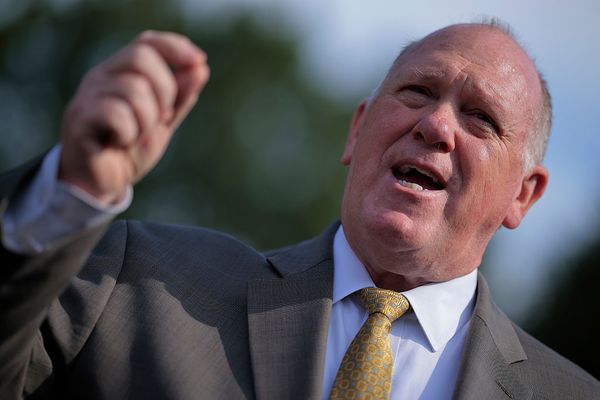
It is hurricane season in the Caribbean and the billionaire owner of Le Grand Bleu, one of the largest superyachts ever to sail the seven seas, is losing sleep over it.
The 113-metre-long vessel belongs to Eugene Shvidler, a Russian-born oil tycoon who was sanctioned by the UK last year, due in part to his long association with Roman Abramovich, himself accused of enjoying a cosy relationship with Vladimir Putin.
Le Grand Bleu, which Shvidler acquired from Abramovich, the former owner of Chelsea FC, has graced some of the world’s most glamorous ports over the years and is valued at nearly £80m. Tourists once complained it was blocking views of the Statue of Liberty when it was moored in New York.
Now the vessel languishes in an industrial shipyard in Ponce, Puerto Rico, where its twin helipads and gleaming white curves offer stark contrast to nearby rusting warehouses.
In a hearing last month at London’s high court, Shvidler launched an effort to have the sanctions on him declared unlawful, accusing the government of oppressive treatment and significant errors in its decision making. A judgment is expected soon. In his witness statements, Shvidler cited the yacht’s jeopardy extensively.
About 47 members of crew had had to be let go, including 10 British citizens, because they could not be paid without potentially breaching sanctions, lawyers said.
A freeze on Shvidler’s sizeable assets – he is said to be worth about £1.3bn – means the remaining skeleton crew have been left waiting for payment and lack the equipment required to sail out of port, should a hurricane make that necessary.
As jarring as such complaints may sound when set against those of the Ukrainian people, whose plight sanctions are designed to alleviate, the tussle between Shvidler and the UK government offers new insight into a curious process: the world of sanctions enforcement.

The Treasury’s enforcer
For a sanctioned oligarch to do their weekly shop, let alone maintain a superyacht, they require permission from a little-known enclave of the Treasury, the Office of Financial Sanctions Implementation (OFSI). Its remit covers everything from Libyan militias to the Iranian and North Korean nuclear programmes.
Since Putin’s tanks rolled into Ukraine, the OFSI’s staff have become desk-bound combatants in Europe’s largest land conflict since the second world war, responsible for enforcing sanctions against 1,600 people targeted as part of international efforts to heap pressure on the Kremlin.
An unglamorous but increasingly time-consuming part of their duty is the operation of a licensing system that is, in theory at least, simple.
When an individual is “designated” and goes on to the UK’s sanctions list, their funds are frozen but they can apply for licences to make payments for reasons such as living expenses – food, rent, utility bills or medicine.
They fill out a form and in return receive a licence that can be presented to their bank, which in turn rubber-stamps transactions that it would otherwise be obliged to block. There are also “extraordinary” situations in which transactions can be permitted, such as for humanitarian reasons or to prevent loss of life. One such exemption covers Shvidler’s licence to keep his boat afloat.
The OFSI also issues general licences, offering blanket permission for expenses such as legal fees or to fulfil prior contractual obligations.
Now it is coming under fire on two fronts, from campaigners on one side and lawyers for sanctioned oligarchs on the other. The former complain that the OFSI is granting sanctioned individuals far too much leeway to deploy frozen funds for what could be deemed questionable purposes.
Lawyers, on the other hand, say that some of their sanctioned clients are facing unfair and intolerable hardship, unable to pay for basic living expenses.

The lawyers’ complaint
“Every time my client went to Waitrose to buy food for the kids, I had to write to OFSI notifying them he’d breached sanctions and committed a criminal offence,” one veteran sanctions lawyer said. “If you were to comply with the law, you’d starve to death. The system is broken: they just cannot cope.”
On this issue, opposing factions find some common ground. The OFSI is, they say, stretched to breaking point and, at times, struggles to function. Before the war, the office employed 40 staff, but has since expanded to more than 140. However, the headcount increase has not kept pace with the mountain of work piling up.
In the year before the Ukraine war, the government received 11 licence applications related to Russian sanctions and approved nine. It has since been inundated with more than 1,000 licence requests, approving 82.
The volume of frozen assets under the Russian sanctions regime has ballooned, from £44.5m in September 2021 to £18.4bn in December 2022.
During the course of Shvidler’s suit against the Foreign Office, the government admitted that an “exponential” increase in licence applications had led to long delays.
Lawyers spoke of young and inexperienced staff recruited from industries such as the travel sector, of interminable delays and basic spelling errors.
Such issues can lead pernickety banks to refuse payment requests – or sometimes embolden tricksy debtors to refuse to settle up, disingenuously citing the risk of breaching sanctions law.
One lawyer pointed to a job advert recently posted by the OFSI, advertising for a new head of “sanctions guidance”, with a salary range starting at £50,000. The role was based in either London or the Treasury’s Darlington campus, with a salary bump for working in the capital. “You’d struggle to get anyone decent at that level,” he said. “Big law firms pay trainees more than that.”
Too much leeway?
The flip side of the coin, however, is that the OFSI has granted licences that test the boundaries of what most people would consider necessary living expenses. “I’ve always advised my clients that, frankly, you shouldn’t be applying for the florist or the yoga teacher,” said a second lawyer with several sanctioned individuals in his client book.
But some licences have allowed for more expensive services. Petr Aven – the former head of Russia’s largest private bank, Alfa-Bank JSC, who is worth an estimated $5.5bn – is fighting a court battle to unfreeze £1.5m of funds held in two companies that he has previously used to manage his UK properties and pay his children’s private school fees.
The National Crime Agency (NCA) had secured an asset freezing order on the companies, alleging they had breached sanctions by making a £200,000 payment to two car dealers and a £160,000 transaction allegedly intended to conceal the sale of a Bentley.
However, the NCA had failed to tell the court, when applying for the freeze order, that the OFSI had granted Aven a licence to access the funds. Westminster magistrates court ruled last year that the money could be used for the benefit of Aven’s family and is still considering whether the accounts can be unfrozen entirely.
Aven’s business associate Mikhail Fridman obtained a licence to pay 19 members of staff, including drivers, private chefs, housekeepers and maintenance staff, according to a report in the New York Times, which said the total cost had reached £300,000 in the first year of the war. The Observer approached Fridman for comment.
The government has since acknowledged that one example was particularly egregious. Last year, the OFSI granted a licence to Yevgeny Prigozhin – head of the Wagner Group, the brutal private army that was accused of perpetrating atrocities in Ukraine before a very public falling-out with Putin, which ended in an apparent coup attempt. Prigozhin was given leave to hire lawyers to sue a British journalist for defamation.
The resulting outcry ultimately led the government to close a loophole that allowed the lawsuit, restricting legal licences so they could not include such actions.
Concerns remain about the overall licensing framework. Sanctioned individuals may apply for licences allowing them to spend up to £60,000 a month, or £720,000 a year, to cover their “basic needs”.
The OFSI also provides for sanctioned people to pay their lawyers up to £500,000 every six months, or £1m if the work began before sanctions were imposed. That is 45 times the cap in the US. Barristers can also be paid up to £1,500 an hour – 15 times the rate allowed in the US.
That sort of cash buys you the best. Shvidler was represented in court by Lord (David) Anderson, who spent six years advising the government on terrorism legislation and earlier this year published a review for the Home Office of the Investigatory Powers Act.
Little wonder that a cottage industry has sprung up within the London legal profession. When Putin’s invasion began, some of the larger law firms in effect fired their Russian clients, leaving this fees bonanza to smaller outfits.
“I knew virtually nothing about sanctions law before February 2022,” said a senior figure at one such firm. “Since then it’s been 90% of my life.”

Campaigners’ concern
The campaign group Spotlight on Corruption has raised concerns that blanket “general” licences are being issued too easily, as a way for hard-pressed staff at the OFSI to reduce their backlog.
The group also raised concern that the UK’s relatively permissive regime is partly geared towards ensuring the continued flow of fees to the legal sector, which was accustomed to a regular income before the war from Russians using the London courts to play out personal and corporate battles.
Susan Hawley, executive director of Spotlight on Corruption, said the licences for legal fees put the UK “at serious odds” with allies such as the US.
“There is a real risk that the government’s general licence – or ‘free pass’ – for the legal sector encourages UK lawyers to adopt a ‘business as usual’ approach and keep profiting from working for clients sanctioned in relation to Russia’s war in Ukraine,” she said.
Rich pickings: top seized assets since the invasion of Ukraine
Since the invasion of Ukraine, the British government has frozen more than £18bn of assets from people it says are linked to the Kremlin, ranging from yachts and private jets to cold hard cash.
The US, EU and other territories around the world have taken similar steps, as part of a co-ordinated international effort to turn the screw on Vladimir Putin by targeting oligarchs.
The British government is now weighing laws that could see some of these assets not just frozen but seized and even sold to help pay for the eventual reconstruction of Ukraine.
The EU has looked at imposing a levy on frozen assets for the same purpose, while members of Congress in the US have proposed parallel measures.
Here are some of the most eye-catching assets that were frozen in the early days of the war. Others sailed or flew out of the reach of the authorities just in time.
Asset: A villa in Cap d’Antibes (pictured)
Estimated value: £100m
Owner: Roman Abramovich
Roman Abramovich had more than £5.4bn of his assets frozen in Jersey last April, while 12 luxury properties were seized by the French government. They included his sprawling Château de la Croë villa complex in Cap d’Antibes in the south of France, once the holiday home of King Edward VIII.
The US has not sanctioned Abramovich but issued freezing orders against two of his jets. Neither aircraft were in the US at the time.
Two of his superyachts, the £750m Eclipse the £458m Solaris, hurriedly left Europe before any attempt by EU countries to seize them and have been seen in Turkish waters.
Asset: The world’s largest superyacht and two helicopters
Estimated value: £460m
Owner: Alisher Usmanov and family
The German authorities seized the $600m (£458m) Dilbar superyacht while it was undergoing repairs in Hamburg last year. They concluded that the vessel was owned by the sister of sanctioned oligarch Alisher Usmanov. Meanwhile, the French authorities froze ownership of two helicopters linked to Usmanov, worth a combined $26m, according to Forbes. A spokesperson for the tycoon reportedly said at the time that the aircraft did not belong to Usmanov but to a family trust.
Two jets linked to Usmanov flew out of Europe before they could be impounded, a Guardian investigation established last year. He also owns the £48m Beechwood House in Highgate, London, and the 16th-century Sutton Place estate in Surrey.
Asset: Two private jets and a superyacht
Estimated value: £120m
Owner: Eugene Shvidler
Roman Abramovich associate Eugene Shvidler complained of “oppressive treatment” by the UK during a legal challenge to sanctions against him. He cited, among other things, the seizure of two private jets - a $45m (£34m) Bombardier Global 6500 jet impounded at Farnborough airport and a $13m (£9.8m) Cessna Citation Latitude jet seized at Biggin Hill. His yacht, Le Grand Bleu, is stuck in Ponce, Puerto Rico, due to restrictions on his ability to pay crew and maintenance costs.
Asset: Planes, yachts and helicopters
Estimated value: Unknown
Owners: Igor Sechin, Suleiman Kerimov, Viktor Vekselberg, and Viktor Medvedchuk
Between them, this quartet have reportedly had a fleet of aircraft and vessels frozen. They include Kerimov’s $300m yacht, the Amadea, seized in the US, and the Tango, a $90m yacht belonging to Vekselberg, which was detained in Spain. A helicopter and private jet belonging to Viktor Medvedchuk, who was considered Putin’s chosen puppet leader in Ukraine, were handed over to the country’s armed forces.
“We urgently need a full independent review to ensure that the UK’s licensing regime is not creating perverse incentives for sanctioned oligarchs to run down their frozen assets, including in legal fees or so-called ‘basic needs.’”
The OFSI’s own annual review suggests it does take the prosperity of British business sectors, such as the legal profession, into account.
Licences, it states, are issued “to protect individual and UK business needs which in turn underpin strong, sustainable and balanced growth”.
A government spokesperson said the unit strongly rejected the notion that the legal licence regime was deliberately permissive in order to benefit the London legal sector.
They said licences were “strictly monitored, with a breach resulting in financial penalties or criminal prosecution”, adding: “These applications are closely scrutinised and frequently rejected.”







